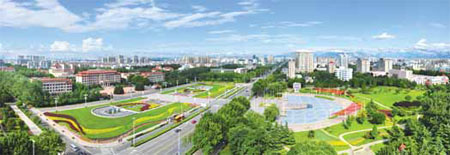Locals find a voice at town hall meetings
By Xie Chuanjiao ( China Daily )
Updated: 2013-07-30
|
|||||||||
|
Chengyang district is the first in Shandong province to stage large-scale town hall meetings. |
At a recent town hall-style meeting in Qingdao's Chengyang district, no public matter was too small to receive a response from officials.
Miao Hua, a resident of Xizhaizitou community in the district, raised the first issue-- her concerns over damaged ditch covers near her home.
"Children often play nearby. I am worried about their safety. I hope it can be fixed as soon as possible," she said.
More than 120 community residents raised a wide range of questions on topics including home renovations, littering and access to healthcare. Officials made note of their concerns and promised to find a solution or give feedback as soon as possible.
Shortly after the meeting, Miao spotted workers replacing the damaged cover near her house. The next day, a safety check of ditch covers was conducted, and all the damaged ones in the community were replaced.
Chengyang district is the first in Shandong province to stage large-scale town hall meetings.
Officials at all 195 communities in the district are ordered to hold these meetings no fewer than three times a year to listen to residents' complaints and solve their problems.
All residents are welcome to attend and air their grievances or ask questions.
Cui Minghua, deputy director of the organizational department of Chengyang district, said the meetings have been well received by residents.
"We used to have only a few dozen resident representatives at such meetings. They cannot represent all," he said.
"We need to listen to different voices from all the people."
Formerly, people could only vote on particular items during meetings, Cui said, but the new meetings allow free discussion for everyone.
The new style obviously puts more pressure on community officials.
Yu Zhongde, Party chief of the Zhonghuangbu community, compared the sessions to fielding questions from reporters at a press conference.
"No matter whether we like the question or not, we have to give an answer on the spot," he said. "Of course, we are nervous."
Cui from the organizational department said the meeting "forces" change.
"The pressure is on officials. In the presence of residents, every answer is a promise," he said. "If you promise, you have to do it."
The agenda of the meeting also includes a discussion of community budget implementation during which officials give details about how money is being spent.
"We have asked officials to cut their speeches short to leave more time for residents," Cui said.
"We hope to provide a real platform for resident to raise their concerns through 'zero distance' communication with officials."
To avoid empty promises from officials, Chengyang district government will dispatch officials to attend each community meeting for supervision.
For questions that cannot be answered on the spot, officials are supposed to give feedback within 10 days after the meeting.
Meanwhile, the district has set up a system to oversee the actions being taken on each problem raised by residents.
Items on the system are color coded to show progress. The performance evaluation of officials will be affected if they have many red marks, which represent unsolved issues.
"As long as we have consensus from residents, we will have more of these meetings," Cui said. "We aim to develop these meetings as a platform for exploring grassroots democracy."
xiechuanjiao@chinadaily.com.cn
(China Daily 07/30/2013 page24)





